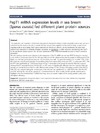Identificador persistente para citar o vincular este elemento:
https://accedacris.ulpgc.es/jspui/handle/10553/10065
| Título: | PepT1 mRNA expression levels in sea bream (Sparus aurata) fed different plant protein sources | Autores/as: | Terova, Genciana Robaina, L. Izquierdo, Marisol Cattaneo, Annagiulia Molinari, Silvia Bernardini, Giovanni Saroglia, M. |
Clasificación UNESCO: | 251092 Acuicultura marina | Palabras clave: | Oligopeptide transporter PepT1 Gene expression Real-time PCR Fish meal substitution Vegetableingredients, et al. |
Fecha de publicación: | 2013 | Publicación seriada: | SpringerPlus | Resumen: | The expression and regulation of intestinal oligopeptide transporter (PepT)-1 when vegetable sources are used as a\nsubstitute for fish meal in the diet of marine fish has not yet been explored. In the present study, as part of our\nongoing work on elucidating PepT1 gene expression in relation to different dietary treatments, we have now\nisolated and deposited in Genbank database (accession no. GU733710) a cDNA sequence representing the PepT1\nin the sea bream (Sparus aurata). The ?de novo? prediction of the three-dimensional structure of PepT1 protein is\npresented.\nWe also analyzed diet-induced changes in the expression of PepT1 mRNA via real-time RT-PCR using the standard\ncurve method. Sea bream were fed for 140 days with one of the following four diet formulations (43% protein/21%\nlipid): a control fast growth-promoting diet (C), and three diets with the same formulation but in which 15% of the\nfish meal was substituted by protein concentrates either from lupine (LPC), chick pea (CPC), or green pea (PPC). Fish\nfed PPC had significantly (p < 0.05) lower levels of PepT1 transcripts in the proximal intestine than the controls,\nwhereas PepT1 transcript levels in fish fed LPC or CPC were not significantly different from the controls. Although\ngrowth was similar between fish fed with different diets during the first 72 days of feeding, growth of the fish fed\nwith PPC was reduced during the second part of the trial and was significantly (p < 0.05) lower than fish fed LPC\nand CPC diets by the end of the experiment. Correlation between these results and fish growth performances\nhighlights that the intestinal PepT1 mRNA level may serve as a useful marker of the dietary protein quality and\nabsorption efficiency. | URI: | https://accedacris.ulpgc.es/handle/10553/10065 | ISSN: | 2193-1801 | DOI: | 10.1186/2193-1801-2-17 | Fuente: | SpringerPlus [ISSN 2193-1801], v. 2 (17), p. 1-14, (Enero 2013) | Derechos: | by-nc-nd |
| Colección: | Artículos |
Citas SCOPUSTM
49
actualizado el 08-jun-2025
Citas de WEB OF SCIENCETM
Citations
49
actualizado el 15-feb-2026
Visitas
176
actualizado el 01-nov-2024
Descargas
200
actualizado el 01-nov-2024
Google ScholarTM
Verifica
Altmetric
Comparte
Exporta metadatos
Los elementos en ULPGC accedaCRIS están protegidos por derechos de autor con todos los derechos reservados, a menos que se indique lo contrario.
